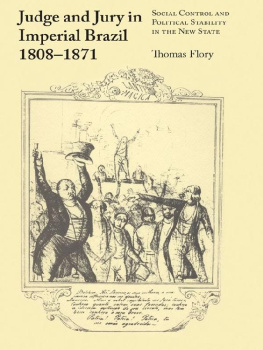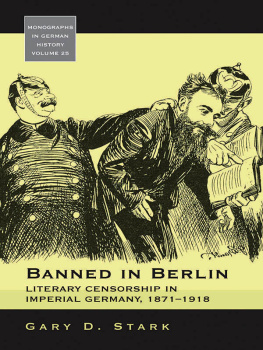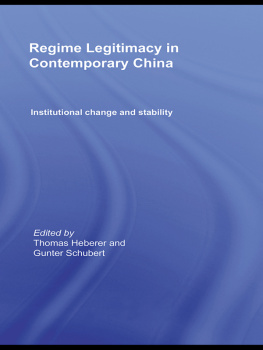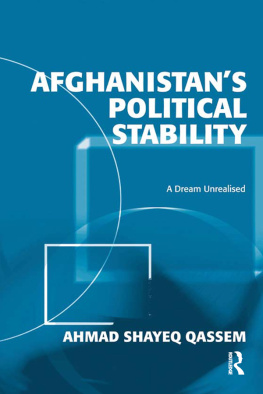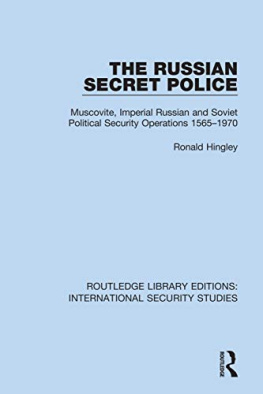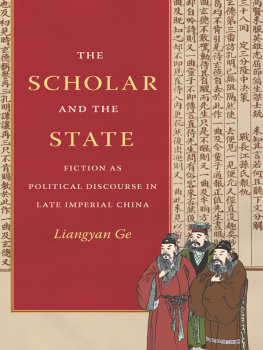Latin American Monographs, No. 53
Institute of Latin American Studies
The University of Texas at Austin
Judge and Jury in Imperial Brazil, 1808-1871
Social Control and Political Stability in the New State
by Thomas Flory
University of Texas Press, Austin
Library of Congress Cataloging in Publication Data
Library ebook ISBN: 978-1-4773-0593-5
Individual ebook ISBN: 978-1-4773-0594-2
DOI: 10.7560/740150
Flory, Thomas, 1947-
Judge and jury in imperial Brazil, 1808-1871.
(Latin American monographs; no. 53)
Bibliography: p.
Includes index.
1. JudgesBrazilHistory. 2. CourtsBrazilHistory. 3. BrazilSocial conditions. 4. LiberalismBrazilHistory. 5. BrazilPolitics and government. I. Title. II. Series: Latin American monographs (Austin, Tex.); no. 53 Law 347.8101 80-23447
ISBN 0-292-74015-8
Copyright 1981 by the University of Texas Press
All rights reserved
Requests for permission to reproduce material from this work should be sent to:
Permissions
University of Texas Press
P.O. Box 7819
Austin, Texas 78712
utpress.utexas.edu/index.php/rp-form
For my Mother and Father
Contents
Joaquim Nabuco, in the biography of his father which remains the fundamental book on the Brazilian empire, stated in an offhand way the paradox which underlies the present study. One cannot make a revolution without the radicals, he wrote, but then one cannot govern with them. Nabuco had in mind a specific situationthe forced abdication of Brazils first emperor in 1831but his paradox is one of basic importance for any new state and it raises questions about change and stability which this book seeks in part to answer. Just who are the men who make revolutions? If one cannot govern with them, with whom can one govern? How, finally, is a working pact forged between government and these its proper constituents?
These are general questions and this book is in one sense a general work about the building of a state and nation by a former colony. As such it ranges over a broad expanse of all but trackless territory within the history of nineteenth-century Brazil. A guide is necessary in this wilderness, and one has been chosen in the theme of judicial policy, for the book is also a case study of the Brazilian inferior court system after independence. Some readers may find the study most valuable at the general level, as one example in a casebook of state-building. For reasons that I hope to make clear in the course of the analysis, however, the study of judicial policy provides more than just a structural device. The importance of judicial reform and judges in nineteenth-century Brazil is in itself a major substantive part of the story. Although the ramifications of judicial policy provide valuable insights into the construction and perpetuation of a state, the very fact of those ramifications is no less the central theme of the work.
In a preface one would like to introduce a book that is entirely self-contained and whose arguments are self-explanatory. The desire is probably an unrealizable one for an historian in any case, but certainly it is a doomed wish for a work that employs the term liberal as often as this one. The concept of liberalism and its variants appear frequently in these pages and require some preliminary comment. Brazilian political liberalism of the post-independence period derived equally from a philosophic commitment to localism and a reinforcing strategic commitment to decentralization. Brazilian liberalism was thus strong and well-founded, but it was also parochial in every sense. In Mexico and Argentina contemporary politicians argued over federalistic reforms to guarantee or diminish the autonomy of provinces. In Brazil they debated the autonomy of the parish, and they did so because the dimensions of this smallest administrative unit coincided most closely with their social and political thinking. Morally the parish was the family slightly enlarged; politically it was the state in remote and extreme miniature. Just why Brazilian liberalism took this form is a question central to this study. It is therefore taken up at some length and from a number of different perspectives in the first section.
A final warning in this area is necessary: until the late 1830s it is not useful to speak of formal political parties in Brazil, yet long before that time men called themselves liberals with partisan intent. For the sake of consistency I have not capitalized the term before true party formation is introduced in . Thereafter, Liberal refers to the party and its members; liberal alludes to strictly nonpartisan contexts. The same distinction will be observed with regard to the term conservative.
My approach to judicial policy is largely defined by the tension between national and local judicial needs, or, put somewhat more abstractly, public and private power. The public component of this heuristic dichotomy is by no means perfectly discrete or even well understood, but it at least displays readily identifiable markers from an early period: the monarch, his ministers, the houses of Parliament. The same is not true of the private componentlocal social structures and especially local elites. This book will present a body of information about local social structures and their dynamics, but it must be stated at the outset that such information falls into something of a descriptive vacuum. Little is known about Brazilian society at the beginning of the nineteenth century, and the historian does well to limit his assumptions. Here I have tried to stay close to those few basic premises that seem compatible with a society in which nearly half the population was black and enslaved and whose economy rested on export agriculture. I assume a hierarchical structure characterized by a certain rigidity between racial and class sectors. But within the free population I have not posited insurmountable social barriers, and I assume a definition of elites that admits considerable breadth and internal flexibility.
Social and intellectual themes are developed in each of the books three parts, but the organizational progression of the parts derives from the standard political chronology.
It is a pleasure to express my deep appreciation of the many kinds of aid and support from which this book and I have benefited. Research funding and time for writing were provided by the Fulbright-Hays program and by two National Defense Foreign Language grants. Federico Edelweiss of Salvador, Bahia, generously opened his private library to me when I badly needed it. Jos Antnio Soares de Souza of Niteri gave me access to the papers of the Visconde do Uruguai. The manuscript in one form or another has profited from the criticism and advice of Woodrow Borah, Maria Odila Silva Dias, Carlos Guilherme Mota, and John Wirth.
My debts to three people can only be recorded here as being of a different order and more inexpressible than the rest. Thanks to Charles Gibson for his support and confidence. Thanks to Richard Graham, who since the beginning has never been far from this project, for his contribution to the book and to the intellectual content of the years when it was taking shape. Finally, thanks to my wife, who is a professional historian and the veteran of enough scholarly ordeals of her own to get a good laugh out of any sentimentality at the end of this one.
Five years after formal independence from Portugal in 1822, Brazils first generation of political leaders began to tear down the colony they had inherited and to build a state that would endure almost until the end of the century. The most intense period of reform lasted from 1827 to 1837the heyday of Brazilian liberalism and the truly revolutionary phase of Brazilian independence. The process of destroying, building, and overhauling, however, was a dialectical one, easily overlooked because within the larger historical context of nineteenth-century Brazil this liberal decade presents some problems of fit. Brazil had become independent with little commotion in 1822, and by the 1840s the country was already being regarded as a model of stability in a wildly disorganized Latin America. The formative interim period is thus often obscured by what appears to be a conspicuous linear achievement of equilibrium, presumably made possible by the inflexible social requirements of a relatively homogeneous landed and slave-owning class. In short, to have no revolutionary content.


